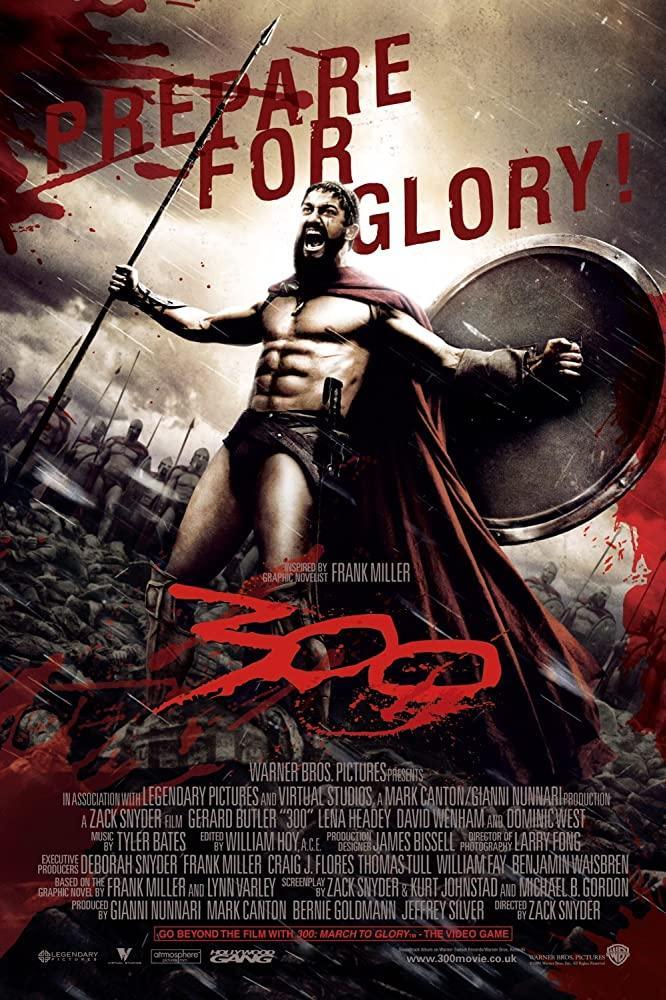300 meaning this is post 300. I could be cheeky and make this a review of the movie 300, but I'm...
Well actually yeah. What the heck. Let's do that.
 |
| Are you prepared? For glory? Or something like that? |
The issue here is that I haven't actually seen 300 in, well, years, and I've only seen it twice I think. So I guess this is less of a review than it is a retrospective; what about 300 has stuck? How has it affected pop culture, if at all? It's an interesting question to be sure, especially given that if you were to go back and watch it again right now, I think you'd be struck by how utterly derivative it seems to modern viewers.
That's not because the movie is derivative, of course, but because everything else is. Now monochromatic color grading was a thing before 300, don't get me wrong. I'm not giving credit to Zack Snyder for inventing the sepia-toned filter. Other films, like the Matrix or heck, even stuff like Saving Private Ryan, used a carefully controlled color grade across the movie to invoke specific responses from the audience and to suggest subtle details alongside. No, I give credit to Zack Snyder and 300 for inventing the concept of a monochromatic color grade not as a tool for storytelling, but rather as a visual style with no other function.
Now that's not to say 300 suffers for it. The design of the sets, costumes, and makeup was clearly very deliberate and intended to be supported by the monochromacy. I just struggle to think of any meaningful reason to do that beyond "it looks cool", and given Zack's later work I have no problem blaming this trend on him specifically. But for 300 it works, and visually the movie is, in general, stunning.
Part of that is the source material. The movie is based off of a graphic novel, with its own heavily stylized artwork, and Snyder's efforts to pay homage to that material resulted in a lot of visual choices that are frankly inspired. The emphasis on slow-motion works here where it might fail in other movies simply because the action was choreographed around the concept. The goal was to use slow motion to mimic the effect of action panes in a comic book, and it works extremely well. Along with that is the unique camera setup Snyder used during some of those scenes to enable a virtually instantaneous rack-zoom, which allows for quick contextualization of the actions on screen and allows for a lot of visual interest without loosing the larger context the scenes work so hard to maintain. Add to that a camera that moves only when needed and avoids shake unless it directly serves the characters on screen, and honestly the whole movie is visually quite artful.
I would say that is the strong point of 300; the visuals and fight choreography. It's all quite good, and Snyder uses plot points and character beats along with visual re-framing to avoid the pitfalls of action fatigue quite well, something that's absolutely necessary in a film with this much action. The rest of the movie isn't so strong, but it's also not necessarily weak. The casting is decent, and the acting is pretty good, if not exactly remarkable. It's probably fair to say that the non-remarkable-ness of the performances could come down to the general fine-ness of the character writing, which was... fine.
The movie also engages in an awful lot of romanticizing of ancient Sparta (and Greek warfare in general), along with a comic-book-esque villainization of Persia and Xerxes in a total package that I'm sure would make a historian's eye twitch pretty much uncontrollably throughout. If you are a historian and you've never seen this before and you're deciding right now to give it a try, my best advice is to think of it as a fantasy world re-imagining of the battle of Thermopylae, and not a re-telling of that story.
In retrospect then I don't have any strong dislike of 300. It's a perfectly fine movie with an okay story told via some actually quite incredible visuals. But my take on its lasting influence is that frankly the best long-term affect is the memes. The movie's influence on Hollywood hasn't been to make directors and DPs think more carefully about how their visuals can be used to enhance their storytelling, but rather it looks like its success, along with the success of projects like the Matrix, has convinced a generation of producers that monochrome sells well. Which isn't the message we should be learning here at all, please, can I have my color movies back?
Anywho, this is also the 300th post on this blog. It's been quite the journey getting here, and I'm sure plenty more journey-ing will be chronicled in the posts to come. So happy 300 My Valley.
May you remain un-sepia'd forever.
Comments
Post a Comment